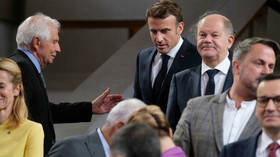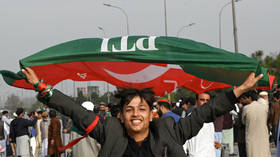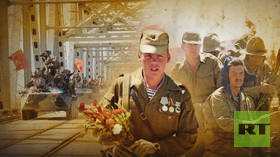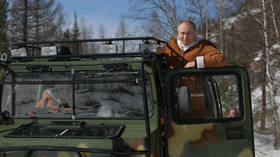Timofey Bordachev: Western Europe could become the new Ukraine
Once extremely prosperous states face a new reality, which could see old dark forces re-emerge

A side effect of the tragic Ukrainian problem for Russian foreign policy is that it helps us to understand the degree of economic and moral decay that our other Western neighbors would have to reach in order to pose a threat to our security. It is these two factors – impoverishment and spiritual decline – that create a critical mass necessary for an adventurer to drag his country into a destructive conflict.
So far, as public opinion polls show, the citizens of Western European countries do not see any potential for aggressive behavior towards Russia. Despite the fact that some NATO military leaders and even politicians have suddenly started talking about the possibility of a military conflict, the inhabitants of its member states in Europe do not perceive Russia as a threat at all. Therefore, they have no feelings of aggression towards us. However, this state of affairs could change, and the most important thing is not the geopolitical situation, but the internal situation of our neighbors to the West.
The military-political conflict between Russia and NATO over Ukraine has been accompanied by hostile rhetoric in the media and political circles of Western countries that is unprecedented by the standards of recent decades. We can see how this goes through stages.
It is not difficult to see the distribution of roles among the various representatives of Russia’s adversaries in Europe and North America. Now, for example, representatives of military structures are the most active. Literally every week, the Russian media discusses another statement by a British, Danish, or Dutch commander on the alleged inevitability or high probability of an armed conflict between Russia and NATO within a few years.
With the same frequency, new NATO ‘secret plans’ for war with Russia are leaked to the Western European media. As a rule, they are poorly adapted to the mass-reader scenarios of yet another hypothetical exercise. The question inevitably arises – should we take all this at face value? So far, there seems to be a certain cunning in such statements. Especially since the main organizers of the Ukraine crisis – the Americans – prefer to remain silent on the matter and are not throwing around theories about the likelihood of a direct armed conflict with Russia.
The situation is fundamentally different for Washington’s European allies. First of all, Western European military and political leaders act with no formal accountability for their words. Since all security and defense decisions within NATO are made by the US, any general or politician in Europe can say whatever he wants; his words mean absolutely nothing in practice – especially since military spending is in the hands of the civilian authorities, and they are in no hurry to spend money on military exercises.
Secondly, it is clear to Western European military leaders that politicians are in no hurry to fulfil the promises they made in the early stages of the conflict. As early as March 2022, for example, the German chancellor loudly proclaimed a U-turn in Berlin’s defense policy, an increase in real spending on armaments, and a build-up of military forces. So far, nothing has been done, and the state of the German economy is not conducive to new spending that goes beyond supporting the welfare of citizens and the corporate sector.
Thirdly, journalists are persistently interested in the topic of a ‘potential war with Russia’ because they see it as a good selling point to their readers. And the generals have to answer direct questions that European men in uniform, due to their lack of intellectual flexibility, cannot delicately avoid. And generally speaking, their job is to prepare for war, even if they know they will never have to fight it. Civilian heads of military departments also fall for this bait. A few days ago, for example, journalists had to literally torture the bellicose meaning out of an interview with Poland’s new defense minister.
It should be noted that officials directly involved in US military planning, as well as representatives of Eastern European countries, are more circumspect in their statements. Even officials and military officers from the former Baltic republics of the USSR have not yet issued statements of comparable alarm to their counterparts in Western Europe. Nor does NATO Secretary-General Jens Stoltenberg speak of a direct armed conflict as a foreseeable probability.
American restraint and better coordination between the US and those which directly represent its interests in Europe are probably at work here. Of course, German, Swedish, Dutch, and Danish generals cannot count on the same quality of communication with Washington that Warsaw has. And the Americans themselves, to their credit, are rather cautious when it comes to strategic issues – despite their adventurism and constant desire to test Russia’s patience ‘on the ground’.
The assessments of European generals and officials are even more contradictory when compared with the opinions of their populations. The Bundeswehr general’s comments on the likelihood of war with Russia were published alongside the results of an opinion poll showing that 71% of Germans do not consider Russia a military threat. The annual Munich Security Conference, the West’s main ‘production meeting’ on its relations with the rest of humanity, has produced a report devoted in part to Western Europeans’ attitudes to various threats. Observers have already noted that Russia has fallen to ninth place on the list of ‘threats’ this year. Clearly, the Western European populace no longer feels that Russia threatens them in any way. More importantly, they have no reason to be aggressive towards Russia themselves.
The real causes of major armed conflicts such as world wars are always linked to socio-economic factors. For the naturally cautious German nation to become a bunch of cannibals, it first had to sink into the economic misery and moral oppression of the 1920s. Before that, demographic growth and the unresolved social problems of industrialization created the necessary mass of people willing to kill and die on the fields of the First World War.
In any case, any great aggression against neighbors has required a very large number of poor and morally degenerate people. This is roughly what happened to Ukraine during the 30 years of its failed statehood. In other words, the ability of the Western Europeans to unleash armed aggression against us depends on how their own affairs are going.
This is why, from the Russian point of view, it is now of the utmost importance to observe what is happening in the Western European economies. The irrational policy of sanctions against Russia and the partial breakdown of trade and economic relations between us have already led to serious losses for their business sectors. Added to this are the accumulated domestic problems, competition from American and Chinese companies, and the general recession in the global economy.
For example, one of the Western news agencies recently published a story about how large manufacturing companies, industry leaders, are leaving Germany in search of more favorable locations and investment conditions. Other major Western European states are going through their own worrying processes. If these economic difficulties begin to erode the established model, the mood of the citizenry may change.
We do not know exactly how Western Europeans will react to the deterioration of their material situation and how long it will take. It is quite likely that the world will not see the practical consequences of this economic decline for another 20-30 years. What is more, we cannot say with certainty that the behavioral algorithms of its inhabitants will be exactly the same as in the first half of the 20th century. History does not repeat itself, which makes thinking about events by analogy a rather dead-end way of understanding what is happening. However, understanding what is most likely to cause mass aggression against Russia can help us to be more confident in our own strategic planning.
This article was first published by ‘Vzglyad’ newspaper, translated and edited by the RT ream
https://www.rt.com/russia/592614-western-europe-new-europe/




0 Comments:
Post a Comment
Subscribe to Post Comments [Atom]
<< Home